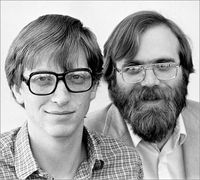
The Obama Era is also the Tech Era. Computing, and the interests of those involved in computing, are going to dominate our politics. Larry Page and his ilk will be able to buy-and-sell the Kochs’ kids.
The empire of oil has fallen and it’s now where manufacturers were in the 1970s, caught in a never-ending margin squeeze. Renewable energy supplies, led by efficiency, keep dropping demand, while costs for fracking keep going up. Last year was a pre-shock, from which the industry is recovering. Think of it as the 1975 game. The next shock, which I estimate will come in 2019, will devastate the fossil fuels industry. It will remain – GM remains – but it will never again be what it was.
So what comes after the Tech Era? The Oil Era began its political reign in 1968, and the Tech Era began its reign in 2008, as I’ve indicated we’re now playing the 1975 game. We’re 7 years into the new era, and just as the MITS Altair launched the PC, something should be percolating underneath all this technology to define what comes next.

But biology is hitting its sweet spot.
Just as the era of computing was defined by an invention, the microprocessor, which extended the reach of software, so the era of biology is going to be defined by an invention, the cloud, extending the reach of genetic science.
The cloud makes it possible to see problems before they become critical, create potential solutions quickly, and model those solutions before they are tested. What happens in the lab thus becomes the end of the discovery process, rather than the start. It’s what happens in human minds, directing computer minds, that’s the key. The decoding of the human genome, in the last decade, creates a road map for discovery that is only now being explored.

Of course, a Bio Era isn’t going to be like the Tech Era. It’s not something you can run entirely out of a garage. Although you can do a lot with a small team using cloud-connected computers. It is one reason why major cities are clustering, growing denser, building new high-end neighborhoods around research institutions. The next garage could be a dorm room.
It’s easy for reporters to be misled here, because these kinds of developments can be relatively close to the poorest neighborhoods, and may even displace them. The recent riots in Baltimore, for instance, happened just 4 miles from the John Hopkins Medical College. The “West Midtown” area of Atlanta, a cluster of high-density, upper-class developments near Georgia Tech, is only a mile from English Avenue, one of the city’s most notorious slums. Economics builds walls around these new enclaves, which expand outward as opportunity grows. It’s called gentrification. I’ve seen it in my own neighborhood. Kirkwood, which went from all-white to all-black within the space of a few years in the 1960s, is now reversing the process owing to its proximity to Emory University.
The point is that, in 1975, Steve Jobs and Steve Wozniak were just college students hanging around the Homebrew Computer Club, looking for a way to turn the newest Intel chips into something functional. Bill Gates was dropping out of Harvard to create a version of the BASIC language. What we know of as the PC era was, at that time, still nascent, in the process of being discovered.

I know all this sounds a little like grasping at straws, but imagine what a reporter in 1975 would have felt if he could not see the Homebrew club, if he just knew computing was going to explode but had no idea how. That’s where we are now, in terms of the Bio Era.
The next Steve Jobs is out there, and they have a biotech bent. So is the next Bill Gates. And the next Larry Page? He’s in a hamper somewhere, drooling. All three are as likely to be a she as a he, as likely to be oriental as white, they could even be African or Latin. The race to the future is on.
Could that next inventor be Chinese? My son is going to China this month to find out. But it’s most likely that, given easy access to capital, resources, and freedom to invent, to think outside existing structures, that even if the next Jobs is Chinese, they’ll be basing their work here. I’m hoping he brings her home – I’d love to meet her.










